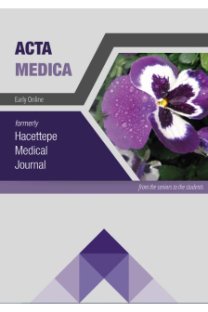Evaluation of Sleep Quality with Use of Angiotensin Receptor Neprilysin Inhibitor in Patients with Reduced Ejection Fraction Heart Failure
Evaluation of Sleep Quality with Use of Angiotensin Receptor Neprilysin Inhibitor in Patients with Reduced Ejection Fraction Heart Failure
Background and Aim: It is known that chronic heart failure reduces sleep quality by causing sleep problems. In recent years, it has been observed that sacubitril-valsartan, which is an angiotensin receptor neprilysin inhibitor, reduces mortality and hospitalization in patients with heart failure. The aim of our study is to examine whether sacubitril-valsartan affects sleep quality in patients with reduced ejection fraction heart failure apart from these benefits. Material and Method: In our study, 44 patients with a history of heart failure with reduced ejection fraction applied to our cardiology outpatient clinic of Gazi Yaşargil Training and Research Hospital were included. Demographic, clinical, laboratory, electrocardiographic, and echocardiographic parameters of these patients were examined. Sacubitril-valsartan treatment was initiated in all patients. Dose titration was performed in patients who could tolerate the treatment. Pittsburgh sleep quality index questionnaire was performed in all patients before treatment and at the end of the second month. Result: The median age of the study population was 61.5 (47.2 - 70.7, IQR) years and 30 (68.2 %) of them were male. There were 30 (72.7 %) ischemic heart failure patients and 14 (27.3 %) non-ischemic heart failure patients. There was a significant decrease in the number of patients with poor sleep quality after angiotensin receptor neprilysin inhibitor treatment compared to baseline [36 (81.8 %) vs 30 (68.2 %), p= 0.031]. In addition, there was a significant decrease in the total Pittsburgh sleep quality index score of patients compared to the baseline [9.0 (7.0 - 12.0) vs 7.0 (5.0 - 9.0), p < 0.001]. Conclusion: In our study, we observed that sacubitril-valsartan treatment improves sleep quality in patients with reduced ejection fraction heart failure
___
- [1] Roger VL. Epidemiology of heart failure. Circ Res 2013;113(6):646-59.
- [2] Ziaeian B, Fonarow GC. Epidemiology and aetiology of heart failure. Nat Rev Cardiol 2016;13(6):368-78.
- [3] Ponikowski P,Voors AA, Anker SD, et al. 2016 ESC Guidelines for the diagnosis and treatment of acute and chronic heart failure: The Task Force for the diagnosis and treatment of acute and chronic heart failure of the European Society of Cardiology (ESC). Developed with the special contribution of the Heart Failure Association (HFA) of the ESC. Eur J Heart Fail 2016;18(8):891-975.
- [4] Değertekin M, Erol C, Ergene O, et al. Heart failure prevalence and predictors in Turkey: HAPPY study]. [Article in Turkish]. Arch Turk Soc Cardiol.2012;40(4):298-308.
- [5] Nasir U, Shahid H, Shabbir MO. Sleep quality and depression in hospitalized congestive heart failure patients. J Pak Med Assoc 2015;65(3):264-9.
- [6] Javadi N, Darvishpour A, Mehrdad N, et al. Survey of Sleep Status and its Related Factors among Hospitalized Patients with Heart Failure. J Tehran Heart Cent 2015;10(1):9-17.
- [7] dos Santos MA, Guedes Ede S, Barbosa RL, et al. Sleeping difficulties reported by patients with heart failure. Rev Lat Am Enfermagem 2012;20(4):644-50.
- [8] Gau FY, Chen XP, Wu HY et al. Sleep-related predictors of quality of life in the elderly versus younger heart failure patients: a questionnaire survey. Int J Nurs Stud 2011;48(4):419-28.
- [9] Riegel B, Ratcliffe SJ, Sayers SL, et al. Determinants of excessive daytime sleepiness and fatigue in adults with heart failure. Clin Nurs Res 2012;21(3):271- 93.
- [10] Azevedo IG,Vieira EM, Neto NR, et al. Correlation between sleep and quality of life in patients with heart failure. Fisioter Pesq 2015;22(2):148-54.
- [11] Chimluang J, Aungsuroch Y, Jitpanya C. Descriptors of Insomnia among Patients with Heart Failure. J Med Assoc Thai 2017;100(4):403-9.
- [12] Javaheri S. Sleep disorders in systolic heart failure: a prospective study of 100 male patients. The final report. Int J Cardiol 2006;106(1):21-8.
- [13] McMurray JJ, Packer M, Desai AS, et al. Angiotensin- neprilysin inhibition versus enalapril in heart failure. N Engl J Med 2014;371:993-1004.
- [14] Ağargün MY, Kara H, Anlar O: Translation and validation of the turkish version of the pittsburg sleep quality index (psqi). Turk Psikiyatri Dergisi 1996;7:107-115.
- [15] Redeker NS, Stein S. Characteristics of sleep in patients with stable heart failure versus a comparison group. Heart Lung 2006;35(4):252-61.
- [16] Príncipe-Rodríguez K, Strohl KP, Hadziefendic S, et al. Sleep symptoms and clinical markers of illness in patients with heart failure. Sleep Breath 2005;9(3):127-33.
- [17] Kanno Y, Yoshihisa A, Watanabe S, et al. Prognostic Significance of Insomnia in Heart Failure. Circ J 2016;80(7):1571-7.
- [18] Lee KS, Lennie TA, Heo S et al. Prognostic Importance of Sleep Quality in Patients With Heart Failure. AJCC(2016), 25;(6): 516-525. doi: 10.4037/ajcc2016219
- [19] Türoff A, Thiem U, Fox H et al. Sleep duration and quality in heart failure patients. Sleep Breath. 2017 Dec;21(4):919- 927. doi: 10.1007/s11325-017-1501-x
- [20] Wang TJ, Lee SC, Tsay SL et al. Factors influencing heart failure patients’ sleep quality. J Adv Nurs. 2010 Aug;66(8):1730-40. doi: 10.1111/j.1365-2648.2010.05342.x
- [21] Khandwalla RM, Grant D, Birkeland K et al. The AWAKE- HF Study: Sacubitril/Valsartan Impact on Daily Physical Activity and Sleep in Heart Failure. Am J Cardiovasc Drugs. 2021 Mar;21(2):241-254. doi: 10.1007/s40256-020-00440-y
- [22] Januzzi JL, Butler J, Fombu E, et al. Rationale and methods of the Prospective Study of Biomarkers, Symptom Improvement, and Ventricular Remodeling During Sacubitril/Valsartan Therapy for Heart Failure (PROVE- HF). Am Heart J. 2018;199:130-136. doi: 10.1016/j. ahj.2017.12.021
- ISSN: 2147-9488
- Yayın Aralığı: Yılda 4 Sayı
- Başlangıç: 2012
- Yayıncı: HACETTEPE ÜNİVERSİTESİ
Sayıdaki Diğer Makaleler
Ferhat Işık, Metin Okşul, Burhan Aslan, Ercan Taştan
CRISPR-based Approaches for the Point-of-Care Diagnosis of COVID19
Başak Yalıcı Armağan, Nilgün Atakan
Burhan Aslan, Mehmet Zülküf Karahan
Dyspnea and Dysphagia as First Sign of Hypopharyngoesophageal Lipoma
Monika Adásková, Katarína Obtulovičová, Marian Sicak
Publication Status of Urology Theses in Turkey
Emrullah Söğütdelen, Mustafa Küçükyangöz
Anesthetic Management with Dexmedetomidine During the Awake Craniotomy Surgery: A Case Report
